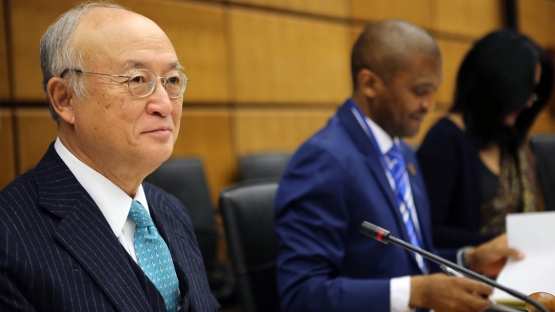IAEA Director General Yukiya Amano highlighted the main areas of the Agency’s Technical Cooperation programme in 2017 in his statement to the Board of Governors on Thursday. He also noted the IAEA’s continued efforts to assist countries dealing with Zika virus disease and reported on the Agency’s verification and monitoring activities in Iran.
The Technical Cooperation programme is the main vehicle through which the IAEA assists countries in using nuclear science and technology in support of their development goals. Priorities are determined by Member States.
Mr Amano said the largest field of activity next year would be nuclear safety and security, followed by health and nutrition, and then by food and agriculture. “Together, these account for 71% of the core programme budget for 2017,” he said.
Successful recent projects included assisting Peru in using nuclear technology to improve the quality of life of patients with severe burns or lesions. “With IAEA assistance, the Tissue Bank of the Peruvian National Children's Health Institute has begun processing tissue which is being used to treat burns victims,” Mr Amano said.
IAEA cooperation with African countries will be further strengthened in areas including human health and nutrition, food and agriculture, and radiation and nuclear safety under a Practical Arrangement to be signed soon between the African Union Commission and the IAEA.
The IAEA will host its first ever International Conference on the IAEA Technical Cooperation Programme in Vienna from 30 May to 1 June next year. “The aim is to raise awareness of the achievements and potential of the TC programme and ensure greater recognition for our work on assisting sustainable development,” Mr Amano said.
Nuclear applications
Turning to nuclear applications, Mr Amano said the IAEA continued to assist countries in the Western Hemisphere in responding to the Zika virus. “Our research into ways of further developing the sterile insect technique against the Aedes mosquitoes, which transmit Zika, has been intensified,” he said.
The sterile insect technique was also successfully used to help the Dominican Republic to respond to infestation of Mediterranean fruit fly in 2015, which prompted the United States to ban imports of fruit and vegetables from the country.
“Our contribution included releasing over 50 million sterile males per week over affected areas,” Mr Amano said. “As a result, the pest was confined to the eastern part of the island and the U.S. Animal and Plant Health Inspection Service lifted a ban on imports of fruit and vegetables from 23 of the Dominican Republic’s 30 provinces.”
He provided an update on the modernisation of the IAEA nuclear applications laboratories, near Vienna, under the ReNuAL (Renovation of the Nuclear Applications Laboratories) project. The foundations of the new Insect Pest Control Laboratory have been completed and construction of the foundations of the Flexible Modular Laboratory will begin in December.
Nuclear energy
Mr Amano briefed the Board on the IAEA’s participation at the UN Climate Change Conference COP22 in Marrakech, Morocco, this month.
“In addition to highlighting the benefits of nuclear power in relation to climate change, Agency experts will explain the support which we provide to Member States in using nuclear and isotopic techniques to tackle serious environmental challenges such as soil erosion, pollution and deteriorating water quality,” he said.
He said nuclear power produces steady baseload electricity while emitting very low levels of greenhouse gases and has already made a significant contribution to avoiding carbon dioxide emissions. “Nuclear power and renewable energy sources complement each other.” There are 450 nuclear power reactors in operation in 30 countries today and 60 reactors are under construction.
Nuclear safety and security
On nuclear security, Mr Amano noted that an IAEA International Conference on Nuclear Security would take place at ministerial level in Vienna from 5 to 9 December. “High-level participation in this Conference will help to maintain the political momentum and to set a strong agenda for nuclear security in the coming years,” he said.
Verification and Monitoring in Iran
Mr Amano said the IAEA continued to verify and monitor Iran’s implementation of its nuclear-related commitments under the Joint Comprehensive Plan of Action.
“For the second time since implementation of the JCPOA began, Iran’s inventory of heavy water exceeded 130 metric tonnes,” he said. “Iran has since made preparations to transfer a quantity of heavy water out of the country, under the verification and monitoring of the Agency. Once it has been transferred, Iran’s stock of heavy water will be below 130 metric tonnes. It is important that such situations should be avoided in future in order to maintain international confidence in the implementation of the JCPOA, which represents a clear gain for nuclear verification in Iran.”
DPRK
Mr Amano reiterated his serious concern about the nuclear programme of the Democratic People’s Republic of Korea (DPRK), which has conducted two more nuclear tests this year.
He called upon the DPRK to fully comply with its obligations under UN Security Council resolutions and to resolve all outstanding issues, including those that have arisen during the absence of Agency inspectors from the country since 2009. “The Agency maintains its readiness to play an essential role in verifying the DPRK’s nuclear programme,” he noted.
Syria
As far as safeguards implementation in the Syrian Arab Republic is concerned, Mr Amano urged Syria to cooperate fully with the Agency in connection with all unresolved issues.




